#pange lingua
Text
"Pange lingua" (prayer incl.) – Hymn in honour of the Blessed Sacrament – Gregorian Chant
youtube
#catholic#catholicism#christianity#spiritual warfare#youtube#jesus christ#our lady#blessed virgin mary#exorcist#demon#gregorian chant#chant#roman catholic church#roman catholic#blessed sacrament#exposition#adoration#benediction#real presence#holy eucharist#pange lingua#traditional catholic#monstrance#prayer#sung prayer#lord jesus christ#holy savior#our lord and savior#saviour#savior
11 notes
·
View notes
Text

OTD in Music History: Composer Anton Bruckner (1824 – 1896) is born in Austria.
Bruckner is widely considered to be one of the greatest symphonists in history. Gustav Mahler (1860 – 1911), who studied with him, called Bruckner his own “forerunner.” Bruckner was also one of the best organists of his day, although curiously he wrote no major works for that instrument.
In his personal life, however, Bruckner was one of the weirdest guys around – an extremely awkward man with a raging inferiority complex who was regularly bullied by his more socially adept colleagues (many of whom literally tinkered with his symphonies, which now exist in a confusing myriad of different versions as a result).
Bruckner experienced extended periods of crippling depression; suffered from severe OCD; was a lifelong bachelor who was constantly trying to marry teenage girls even into his old age; and had a morbid fascination with death (after his mother died, he commissioned a portrait photograph of her corpse which he thereafter displayed on his desk).
On the latter point, Bruckner developed an extreme obsession with viewing dead bodies. He became a frequent visitor at funeral parlors and random funerals, and he even (unsuccessfully) sought permission to exhume the body of his dead cousin. When the remains of Ludwig van Beethoven (1770 – 1827) and Franz Schubert (1798 – 1828) were exhumed to be moved to Vienna’s Central Cemetery in 1888, Bruckner “fingered and kissed the skulls of both composers.” He also allegedly dropped a lens from his pince-nez into Beethoven’s coffin, where it presumably still remains to this day...
PICTURED: A c. 1910s real photo postcard showing the elderly Bruckner.
Given Bruckner’s obsession with death, it is hardly surprising that he gave very specific instructions on how to deal with his own dead body. In October 1896, he died at age 72 in Vienna. His body was initially released for viewing at the St. Charles Church in Vienna, and then five days later he arrived back at the St. Florian Monastery in his hometown of Linz, where he had served as the organist for many years.
Between the viewing in Vienna and the burial in Linz, however, a certain “Professor Paltauf” had mummified Bruckner’s body – just as the composer had specified in his Will. Bruckner was then buried in a coffin *with a glass plate inserted into the lid*, so that his mummified face could be easily viewed by curious onlookers in perpetuity.
In 1996, in preparations for Bruckner’s centenary celebrations, monastery authorities discovered that Bruckner’s mummy had begun to decay. They arranged for the mummy to take a secret restoration trip over to Switzerland… and after being “restored” in both body and clothing, Bruckner was returned to Linz, where officials declared the project a resounding success, proclaiming that it looked “like he just died yesterday.”
Judge for yourself at https://www.abruckner.com/editorsnote/features/talesofthecrypt/therepairofantonbr/
#Anton Bruckner#Bruckner#classical music#music history#composer#classical composer#classical studies#organist#classical organist#organ#Symphony#Te Deum#masses#motets#Pange lingua#Vexilla regis#Requiem#Psalm#Orchestra#Overture#Chamber music#Intermezzo#classical musician#classical musicians#classical history#maestro#historian of music#concert#concerto#piano
3 notes
·
View notes
Text
After the noon mass, we got to do the novena to the immaculate conception. There were only few people, I was able to join them in singing the Pange Lingua!! Felt amazing.
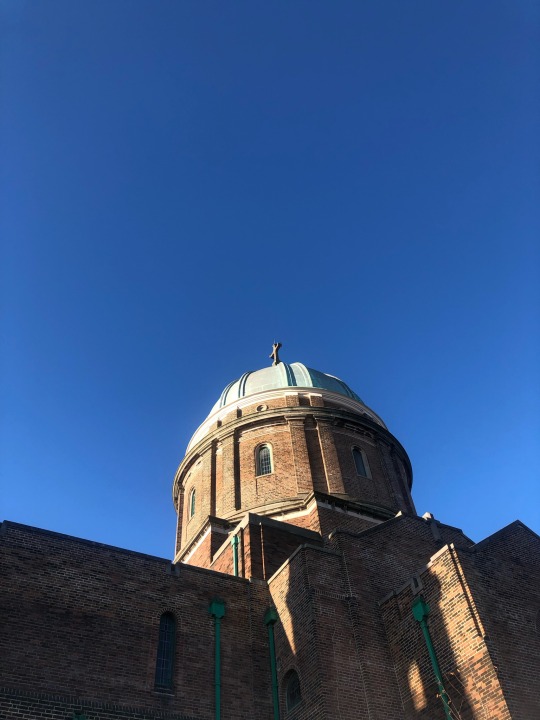

#pange lingua#at the church#dome of home#domeofhome#immaculate conception#novena#Mother Mary#saints Peter and Paul and st Philomena church#church diaries
1 note
·
View note
Text
The Tantum Ergo (and I guess by extension the entire Pange Lingua Gloriosi) is like THE most beautiful hymn imo. We don't talk about her enough. Like so beautiful and regal and fit for the King and Creator of the Universe but also gentle enough to fall asleep to or to rock an infant to without major disruption. Speaking the beautiful truths from the pen of the Angelic Doctor. Like. Bro. *vigorous vague hand gestures*
#anyway this is your cue to listen to the Tantum Ergo#In Latin#chanted#Like right now#Or whenever you see this post#my faith#Catholicism#Tantum Ergo Sacramentum#Pange Lingua Gloriosi#hymns
2 notes
·
View notes
Video
youtube
9 notes
·
View notes
Text
ik its kinda dumb but sometimes at night i go into the campus chapel and because it has a really good echo i sing songs to Jesus in the tabernacle and show Him all the music i've been listening to all week because i want to know if He'll like it or not and i mumble about poetry being amazing and then after a while i sit in silence and sing Pange Lingua because there is no other hymn etched as deeply in my heart as that one and sometimes that's what my prayers sound like
#music is something so important to me#i feel like i have to share it so much#last night i sang Young and beautiful by lana del rey and i could kinda. like. feel the answer always being yes forever and ever and ever#will you still love me when i got nothing but my aching soul? i know you will i know you will i know that you will.#idk#there are many benefits to attending a catholic college
54 notes
·
View notes
Text
THIS DAY IN GAY HISTORY
based on: The White Crane Institute's 'Gay Wisdom', Gay Birthdays, Gay For Today, Famous GLBT, glbt-Gay Encylopedia, Today in Gay History, Wikipedia, and more … December 14

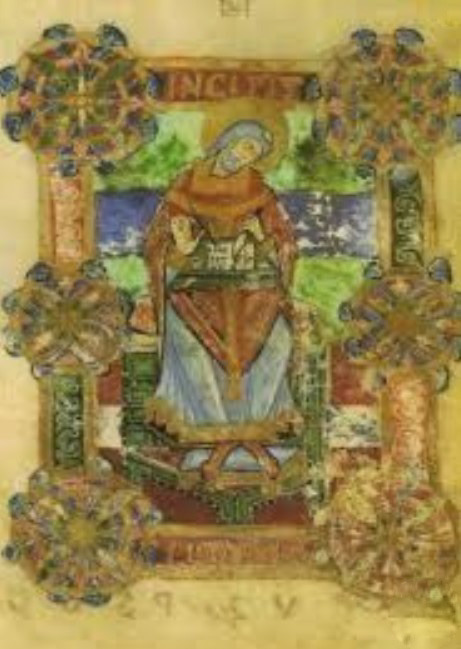
c.530 – Venantius Fortunatus (d.circa 600/609) was a Latin poet and hymnodist in the Merovingian Court, and a Bishop of the early Catholic Church. He was never canonised but was venerated as Saint Venantius Fortunatus during the Middle Ages.
Born in Treviso, near Ravenna in Italy, he spent his time as court poet to the Merovingians. After visiting the tomb of St. Martin of Tours at St. Hilary at Poitiers, he decided to enter a monastery.
He continued to write poetry, some of which have a permanent place in Catholic hymnody, for instance the Easter season hymns "Vexilla Regis" and the "Pange Lingua" (Sing, O my tongue, of the battle). Three or four years before he died he was made bishop of Poitiers. Although never canonized, he was venerated as a saint in the medieval church, and his feast day is still recognized on 14th December each year.
Like Paulinus of Nola, St Venantius's poetry also includes some decidedly secular verse of the romantic sort. That this celebrates male love is clear from its inclusion in the Penguin Book of Homosexual Verse.
"Written on an Island off the Breton Coast"
You at God's altar stand, His minister
And Paris lies about you and the Seine:
Around this Breton isle the Ocean swells,
Deep water and one love between us twain.
Wild is the wind, but still thy name is spoken;
Rough is the sea: it sweeps not o'er they face.
Still runs my lover for shelter to its dwelling,
Hither, O heart, to thine abiding place.
Swift as the waves beneath an east wind breaking
Dark as beneath a winter sky the sea,
So to my heart crowd memories awaking,
So dark, O love, my spirit without thee.
Fortunatus died in the early 600s. He was called a saint after his death, but was never formally canonized.


1791 – Today is the birthday of the Irish poet Charles Wolfe (d.1823). Born at Blackhall, County Kildare, Wolfe attended Trinity College, Dublin between 1809 and 1814 and was ordained as a Church of Ireland priest in 1817. He is remembered for his poem "The Burial of Sir John Moore after Corunna", written in 1816 and much collected in 19th and early 20th century anthologies.
Wolfe's sexuality is often disputed, many believe he was homosexual. He certainly had an extremely intense friendship with the Rev. Thomas Meredith for whom he wrote two gushing epithets. Wolfe died from tuberculosis caught from a cow at the age of 32. Yes. A cow. Even into the mid-20th century tuberculosis was commonly transferred via milk.

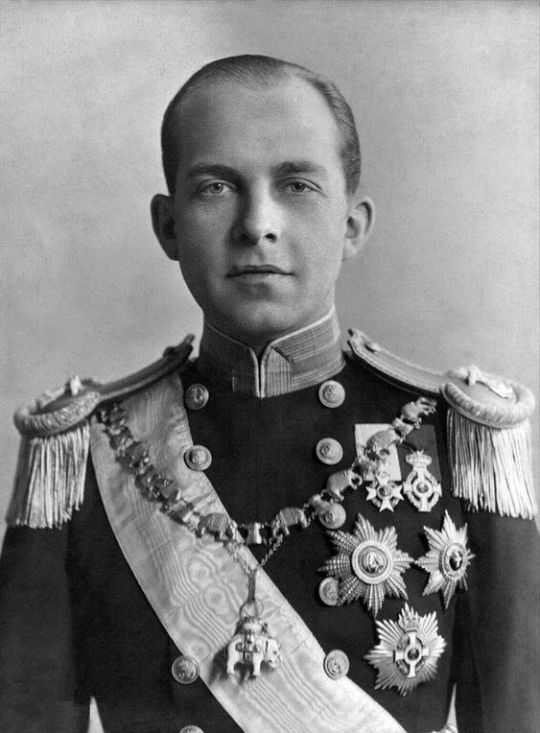
1901 – King Paul of Greece (d.1964) reigned as king of Greece from 1947 to 1964. He may have been bi-sexual.
Paul was born in Athens, the third son of King Constantine I of Greece and his wife, Princess Sophia of Prussia. He was trained as a naval officer. On 9 January 1938, Paul married Frederika of Hanover at Athens. They had three children.
Before his marriage he is alleged to have invited the homosexual literary muse, Denham Fouts, on a cruise of the Aegean Sea, perhaps because they were lovers. However, Fouts's friend John B. L. Goodwin said Fouts often made up stories about his life, and literary critic Katherine Bucknell thought many of the tales about him were myth.
During most of World War II, when Greece was under German occupation, he was with the Greek government-in-exile in London and Cairo. From Cairo, he broadcast messages to the Greek people.
Paul returned to Greece in 1946. He succeeded to the throne in 1947, on the death of his childless elder brother, King George II.


1951 – Today's the birthday of American actor and puppetteer Paul Zaloom. He's best known for his role as the character Beakman on the television show Beakman's World, based on the Universal Press Syndicate syndicated comic strip You Can With Beakman and Jax created by Jok Church.
Paul Zaloom was educated at The Choate School (now Choate Rosemary Hall) in Wallingford, Connecticut, and began his entertainment career at Goddard College with artists in residence the Bread and Puppet Theater, a troupe specializing in self-invented, home-made theater. One of their performance locations was Coney Island, where Zaloom is said to have given advice to the "unofficial Mayor of Coney Island", Dick Zigun, on how to bring in the crowds. In his solo work he utilizes found-object animation, in which he takes objects as varied as coffee pots and humidifiers and turns them into elements of political satire. His personal politics are liberal; he has referred to Elizabeth Dole and Margaret Thatcher as "right wing nut jobs." He has also been a fierce critic of U.S. foreign policy since the early 1980s, having helped to lead a disarmament march during the Cold War.
In 1992 Zaloom starred in the cable TV children's science program Beakman's World. The show moved to CBS in 1993 and aired for four seasons. Zaloom has also written, designed and performed eleven full length one-man shows, including Fruit of Zaloom, Sick But True, Mighty Nice, and The Mother of All Enemies, the latter a shadow-puppet show featuring traditional Middle-Eastern comic puppet character Karagoz. His latest effort tackles social issues such as privacy, the war on terrorism, and discrimination based on sexual orientation and ethnicity. Aside from shadow puppetry, Zaloom's idiosyncratic work utilizes techniques such as overhead projection, government document expose, cantastoria picture performance, toy theater, as well as hand, rod, found object, and dummy puppets.
Zaloom has described himself as "a Gay, Buddhist, agnostic, quaker, secular humanist knucklehead."

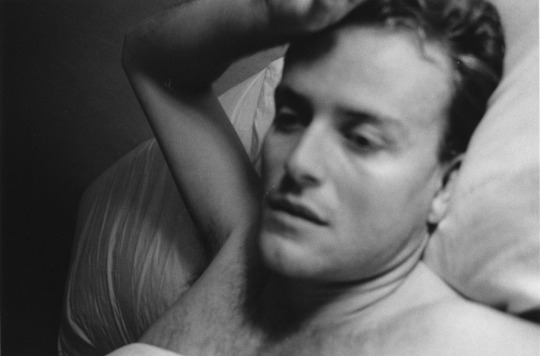
1955 – Hervé Guibert (d.1991) was a French writer and photographer. The author of numerous novels and autobiographical studies, he played a considerable role in changing French public attitudes to AIDS. He was a close friend and lover of Michel Foucault.
Guibert was born in Saint-Cloud, Hauts-de-Seine, to a middle-class family and spent his early years in Paris, moving to La Rochelle from 1970 to 1973. In his teens Hervé Guibert lied about his age to work at the magazine 20 ans eventually leading to a job with Le Monde. After working as a filmmaker and actor, he turned to photography and journalism. In 1978, he successfully applied for a job at France's prestigious evening paper Le Monde and published his second book, Les aventures singulières (published by Éditions de minuit). In 1984, Guibert shared a César Award for best screenplay with Patrice Chéreau for L'homme blessé. Guibert had met Chéreau in the 1970s during his theatrical years.
Guibert's writing style was inspired by the French writer Jean Genet. Three of his lovers occupied an important place in his life and work: Thierry Jouno, director of an institute for the blind whom he met in 1976, and which led to his novel Des aveugles; Michel Foucault, whom he met in 1977; and Vincent Marmousez, a teenager of fifteen who inspired his novel Fou de Vincent.
In January 1988 Guibert was diagnosed with AIDS. From then on, he worked at recording what was left of his life. In June the following year, he married Christine, the partner of the late Thierry Jouno, so that his royalty income would eventually pass to her and her two children. In 1990, Guibert publicly revealed his HIV status in his roman à clef "À l'ami qui ne m'a pas sauvé la vie" (published in English as To the Friend Who Did Not Save My Life). Guibert immediately found himself the focus of media attention, featured in newspapers and appearing on several television talk shows.
Two more books also detailing the progress of his illness followed: Le Protocole compassionnel (published in English as The Compassionate Protocol) and L'Homme au chapeau rouge (published in English as The Man In The Red Hat), which was released posthumously in January 1992, the same month French television screened La Pudeur ou l'impudeur, a home-made film by Guibert of his last year as he lost his battle against AIDS. Almost blind as a result of disease, he attempted to end his life just before his 36th birthday, and died two weeks later.


1960 – Bob Paris, American bodybuilder and Gay rights advocate, born; The former Mr. Universe, and International Federation of BodyBuilders professional bodybuilder, Bob Paris is a writer, public speaker and civil rights activist. He acknowledged his sexuality in the July 1989 issue of Ironman magazine and has graced the covers of scores of magazines worldwide. After Paris officially came out as a Gay man in the media, he and his then-partner, Rod Jackson, became involved in marriage equality advocacy, started successful non-profits, lectured on a wide variety of Gay civil rights issues, and made many television, radio, newspaper and magazine appearances. The two separated in 1995. Today, Paris lives with his spouse of eleven years, Brian, on an island near Vancouver, British Columbia. Bob and Brian were legally married after Canada equalized the marriage laws in 2003.
In addition to his writing career, Bob Paris remains a committed civil rights advocate as well as a motivational speaker, model and actor. In 1998, he made his New York stage debut, starring at Carnegie Hall opposite Bea Arthur, Sandy Duncan and Tyne Daly in the Broadway musical, Jubilee as the character Mowgli. He is one of the subject of photographer Herb Ritts' gorgeous book, Duo. His official website is: http://www.bobparis.com/


1968 – Yotam Ottolenghi is an Israeli-English chef, restaurateur, and food writer. He is the co-owner of six delis and restaurants in London, as well as the author of several bestselling cookbooks, including Ottolenghi (2008), Plenty (2010), Jerusalem (2012) and Ottolenghi Simple (2018).
Ottolenghi was conscripted into the Israeli Defense Forces in 1989, serving three years in IDF intelligence headquarters. He then studied at the Adi Lautman Interdisciplinary Program for Outstanding Students of Tel Aviv University, where in 1997, he completed a combined bachelor's and master's degree in comparative literature; his thesis being on the philosophy of the photographic image. While working on his thesis, Ottolenghi served as a night copy editor for Haaretz.
In 1997, Ottolenghi and his then-partner Noam Bar moved to Amsterdam, where he edited the Hebrew section of the Dutch-Jewish weekly NIW and considered getting his doctorate in comparative literature. Instead, he moved to London to study French cooking at Le Cordon Bleu.
Ottolenghi met his partner Karl Allen in 2000; they married in 2012 and live in Camden with their two sons, Max and Flynn. In 2013, Ottolenghi "came out as a gay father" in a Guardian essay that detailed the lengthy process of conceiving Max via gestational surrogacy, an option that he believes should be more widely available to those who cannot conceive naturally.
Ottolenghi served as a pastry chef at three London restaurants: the Michelin-starred Capital Restaurant, Kensington Place, and Launceston Place in Kensington New Town. In 1999, he became head pastry chef at the artisanal pastry shop Baker and Spice, where he met the Palestinian chef Sami Tamimi, who grew up in Jerusalem's Old City. Ottolenghi and Tamimi bonded over a shared language—Hebrew—and a joint "incomprehension of traditional English food".
His debut cookbook Ottolenghi was published in 2008 and has sold over 100,000 copies. Six volumes have followed: the all-vegetable cookbooks Plenty (2010) and Plenty More (2014); Jerusalem (2012); Nopi (2015); the dessert cookbook Sweet (2017); and Ottolenghi Simple (2018).
Ottolenghi's bestselling cookbooks have proven influential, with The New York Times noting that they are "widely knocked-off for their plain-spoken instructions, puffy covers, and photographs [that Ottolenghi] oversees himself, eschewing a food stylist". In 2014, the London Evening Standard remarked that Ottolenghi had "radically rewritten the way Londoners cook and eat", and Bon Appetit wrote that he had "made the world love vegetables".


1989 – Amini Fonua is a Tongan competitive swimmer.
Fonua was born and raised in Ponsonby, Auckland, New Zealand to Tongan lawyer Sione Fonua and British-born mother Julie. He holds dual Tongan and New Zealand citizenship. His family includes two other sisters.
Fonua's swimming career began at the Roskill Swimming Club based at Cameron Pool in Auckland, coached by Sandra Burrow from 1999–2007. He broke numerous Auckland and New Zealand Age Group Records under Burrow's tenure. He then moved to West Auckland Aquatics in 2007, and was coached by Donna Bouzaid. In the Fall of 2008, Fonua enrolled at Texas A&M on a swimming scholarship. While at Texas A&M he was a peer voted Team Captain, Big XII Conference Champion, NCAA All-American, and recipient of The Aggie Heart Award. He graduated with a Telecommunication and Multi-Media degree, with a Minor in Creative Writing in May 2013.
He was the first Tongan swimmer to win a gold medal in international competition, when he took gold in the 50 metre breaststroke at the 2010 Oceania Swimming Championships.
In preparation for the 2012 London Olympics Fonua was trained by New Zealander and designated head coach for Tonga, Jon Winter. He served as his nation's flag-bearer in the 2012 Summer Olympics Parade of Nations. As a swimmer at the 2012 Summer Olympics, he competed in the Men's 100 metre breaststroke, failing to reach the semifinals.
Fonua made an international comeback at the 2015 Pacific Games in Port Moresby, Papua New Guinea. He created history by becoming the first ever Tongan athlete to ever win 3 Gold medals at a Pacific Games by sweeping the Breaststroke events, setting 2 Games Records in the process (50 m and 100 m Breaststroke). He is the only Tongan athlete in history to ever hold dual Oceania and Pacific Games titles.
Fonua is openly gay and an advocate for LGBT rights.


13 notes
·
View notes
Text
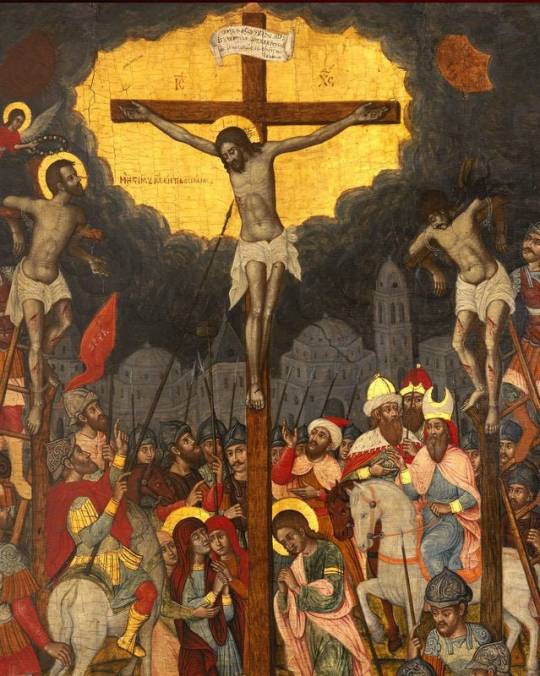
Christ is our victorious king, not in spite of the Crucifixion, but because of it: 'I call Him king, because I see Him crucified' (Saint John Chrysostom, Second Sermon on the Cross and the Robber).
Such is the spirit in which Orthodox Christians regard Christ's death upon the Cross. Between this approach to the Crucifixion and that of the medieval and post-medieval west, there are of course many points of contact; yet in the western approach there are also certain things which make Orthodox feel uneasy. The west, so it seems to them, tends to think of the Crucifixion in isolation, separating it too sharply from the Resurrection. As a result the vision of Christ as a suffering God is in practice replaced by the picture of Christ's suffering humanity: the western worshipper, when he mediates upon the Cross, is encouraged all too often to feel a morbid sympathy with the Man of Sorrows, rather than to adore the victorious and triumphant king. Orthodox feel thoroughly at home in the language of the great Latin hymn by Venantius Fortunatus (530-609), Pange lingua, which hails the Cross as an emblem of victory:
Sing, my tongue, the glorious battle,
Sing the ending of the fray;
Now above the Cross, our trophy,
Sound the loud triumphal lay:
Tell how Christ, the world's redeemer,
As a victim won the day.
-- Kallistos Ware, The Orthodox Church
13 notes
·
View notes
Video
youtube
A Mass for Holy Thursday:
Josquin des Prez, Missa Pange lingua
Beautifully performed by Tallis Vocalis, Edward Wickham, director
5 notes
·
View notes
Text
ok so ive been getting back to translating the Z theme and i have a question if anybody knows

WHAT DOES THIS MEAN
ive been looking through the og text (pange lingua gloriosi proelium certaminis) and this is the only one that stands out from the rest
from what ive looked its the first line but mixed a little ie:

ive tried my best to translated but really sucked at it (latin is hard lmao)
if anybody is willing to help that would me awesome (i only need this otherwise ive figured out the rest)
#wangan midnight#latin#latin language#i wanted to next to translate the hynm in the final countdown in wmmt 4 but oh god is it hard#also the trailer music for 4 has one as well sooooo [eyes]
15 notes
·
View notes
Text
Medieval Latin Hymn Lauda Sion

"Lauda Sion" is a sequence prescribed for the Roman Catholic Mass for the feast of Corpus Christi. It was written by St. Thomas Aquinas around 1264, at the request of Pope Urban IV for the new Mass of this feast, along with Pange lingua, Sacris solemniis, and Verbum supernum prodiens, which are used in the Divine Office
Sion, lift up thy voice and sing praise thy Savior and thy King, Praise with hymns thy shepherd true.
All thou canst, do thou endeavour yet thy praise can equal never Such as merits thy great King.
See today before us laid the living and life-giving Bread, theme for praise and joy profound.
The same which at the sacred board was, by our incarnate Lord giv'n to His Apostles round.
Let the praise be loud and high sweet and tranquil be the joy felt today in every breast.
On this festival divine which records the origin of the glorious Eucharist.
On this table of the King our new Paschal offering brings to end the olden rite.
Here, for empty shadows fled is reality instead here, instead of darkness, light.
His own act, at supper seated Christ ordain'd to be repeated in His memory divine;
Wherefore now, with adoration we, the host of our salvation consecrate from bread and wine.
Hear, what holy Church maintaineth that the bread its substance changeth into Flesh, the wine to Blood.
Doth it pass thy comprehending? Faith, the law of sight transcending leaps to things not understood.
Here beneath these signs are hidden priceless things, to sense forbidden signs, not things, are all we see.
Flesh from bread, and Blood from wine yet is Christ in either sign all entire, confessed to be.
They, who of Him here partake sever not, nor rend, nor break but, entire, their Lord receive.
Whether one or thousands eat all receive the self-same meat nor the less for others leave.
Both the wicked and the good eat of this celestial Food but with ends how opposite!
Here tis life and there tis death the same, yet issuing to each in a difference infinite.
Nor a single doubt retain when they break the Host in twain but that in each part remains what was in the whole before.
Since the simple sign alone suffers change in state or form the signified remaining one and the same for evermore.
Behold the Bread of Angels for us pilgrims food, and token of the promise by Christ spoken children's meat, to dogs denied.
Shewn in Isaac's dedication in the manna's preparation in the Paschal immolation in old types pre-signified.
Jesu, shepherd of the sheep Thou thy flock in safety keep living bread, thy life supply strengthen us, or else we die fill us with celestial grace.
Thou, who feedest us below source of all we have or know grant that with Thy Saints above sitting at the feast of love we may see Thee face to face amen. Alleluia.
The Gregorian melody of the Lauda Sion is borrowed from the eleventh-century sequence Laetabundi iubilemus attributed to Adam of Saint Victor. The hymn tells of the institution of the Eucharist and clearly expresses the belief of the Roman Catholic Church in transubstantiation, that is, that the bread and wine truly become the Body and Blood of Christ when consecrated by a validly-ordained priest or bishop during the Mass. Lauda Sion is one of only four medieval sequences which were preserved in the Roman Missal published in 1570 following the Council of Trent (1545–1563).
12 notes
·
View notes
Text
Pange Lingua Gloriosi - Tantum Ergo Sacramentum - Corpus Christi/Maundy Thursday - Gregorian Chant
youtube
#pange lingua gloriosi#catholic#catholicism#christianity#spiritual warfare#jesus christ#youtube#our lady#blessed virgin mary#exorcist#demon#blessed sacrament#holy eucharist#tantum ergo#tantum ergo sacramentum#corpus#corpus christi#maundy thursday#gregorian chant#chant#benediction#exposition#adoration#choir#roman catholic church#roman catholic#latin
2 notes
·
View notes
Text
A lingua franca is necessary for smooth global relations and extremely convenient when you’re growing up speaking said lingua franca but every now and then there’s a pang of guilt over being the lingua franca culture. There’s a certain brashness to walking up to some German and accosting them in a language not their own with a reasonable expectation of them knowing it.
If someone rolled up to my house asking directions Japanese and then questioned whether I was faking it when I communicated that I didn’t understand the language I would be rather irate, but outside of Africa (where the lingua Franca is quite literally French in many places) you can expect to meet someone who speaks broken English basically anywhere tourists go. Consider this a Symptom of the English speaking countries rolling tanks into and occupying most of Europe and a good portion of Asia during a series of activities ranging from “colonialism” (hence that French-speaking Africa note) to “winning a world war for you.”
Latin or similar popular but dead languages would be an interesting if Eurocentric replacement, but it’s also a dead language that nobody speaks unless they have to or they’ve found a cool bug. My vote would of course land right back on another language I’ve known since birth, but I think we can all agree that anything we decide on is better than French.
#Spanish as a lingua Franca would be fun#one I’m not fluent in#maybe it should be like Finnish or something just for fun
5 notes
·
View notes
Text
youtube
Body and Blood Official Music Video - Damascus Worship (feat. MarySarah Menkhaus) [Live]
“Damascus Worship is a Catholic Missionary Worship Movement that aims to glorify God and awaken His people to worship and live for Him in Spirit (bold, free, and alive) and in Truth (authentic, faithful, and obedient).
Summer EP features three of our “songs of the summer.” These songs capture the annual themes of Catholic Youth Summer Camp and focus on a central component of the Catholic faith, serving as our anthems each summer.
In 2022, our theme was Fons et Culmen: Source and Summit. In the Catechism of the Catholic Church, we read that “the Eucharist is the source and summit of the Christian life” (CCC 1324). From this, the song “Body and Blood” came to life.
As we began to write this song, we prayed with Thomas Aquinas’ “Pange lingua,” an ancient hymn about the body and blood of Jesus Christ. We wrote “Body and Blood” as a cover of this hymn, and incorporated an additional chorus as a fruit of our prayer.”…
#Damascus Worship#worship#worship music#Catholic#Catholicism#I don’t know if you like worship music but here is some for you if you do
4 notes
·
View notes
Text
Our Morning Offering – 11 June – Pange Lingua Gloriosi Corporis Mysterium
Our Morning Offering – 11 June – “The Month of the Sacred Heart of Jesus” – The Solemnity of Corpus Christi, The Most Holy Body and Blood of Our Lord Jesus Christ and Sunday within the Octave – The Second Sunday after Pentecost
Pange Lingua Gloriosi Corporis MysteriumSing, My TongueBy St Thomas Aquinas (1225-1274)Eng trans – Fr Edward Caswell CO (1814-1878)(Excerpt on the image – the 4 last…

View On WordPress
9 notes
·
View notes
Video
youtube
Pange Lingua | Catholic Hymn & Chant | Holy Thursday/Corpus Christi | Latin (w/ English translation)
Sunday 7pm Choir | Catholic & Christian Choral Music
"Pange Lingua Gloriosi" is a Latin hymn written by Saint Thomas Aquinas for the Feast of Corpus Christi. It is also sung on Maundy Thursday (Holy Thursday) during the procession from the church to the place where the Blessed Sacrament is kept until Good Friday.
#music#catholic#hymn#pange lingua gloriosi#corpus christi#lent#maundy thursday#sunday7pmchoir#latin#english subtitles
2 notes
·
View notes